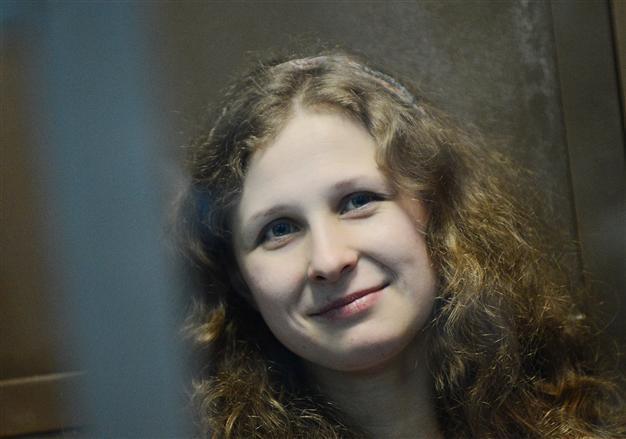Jailed Pussy Riot member slams routine in 'grey' camp
MOSCOW - Agence France-Presse

A file picture taken on October 10, 2012 shows one of the jailed members of the all-girl punk band "Pussy Riot," Maria Alyokhina as she smiles while sitting in a glass-walled cage in a court in Moscow. AFP photo
One of Russia's jailed Pussy Riot punk band members complained Monday of grey monotony and strict rules in her prison camp in the Urals mountains, in her first detailed account of her experiences.In an article in The New Times weekly, Maria Alyokhina, 24, described her first weeks at Corrective Labour Colony No. 28 in the Perm region, where she is serving a two-year sentence for the group's anti-Vladimir Putin performance in a church.
"Everything around is grey. Even if something is another colour, all the same it has an element of grey. Everything: the buildings, food, the sky, words," said Alyokhina, the mother of a young son, who writes poetry and has taken part in ecological activism. The camp is surrounded by factories belching harmful fumes and by coniferous forest, she said.
"It is an anti-life," added Alyokhina, who last month asked to be transferred to solitary confinement after conflicts with fellow inmates.
The camp is a "dead world," where prisoners feel "not needed, discarded," she said.
She said she was transferred to the camp via three prisons, travelling in train cars and vans, before driving through the iron gates with 18 other prisoners.
In the initial quarantine quarters where inmates are placed for the first days of their terms Alyokhina said women got into a routine of rising at 5:30 am.
They would run to a bathroom with three basins and two toilets for 40 prisoners and then head to breakfast at 6 am, she wrote.
"I will have to run about constantly for the next one-and-a-half years. I am getting used to things." The women learned prison rules by rote in a special room with a security camera where falling asleep was banned, she said. To pass the time in quarantine, women strung together individual cigarettes because packs are banned and sewed nametags onto their uniforms, she wrote. The camp has a workshop where women sew 12 hours a day for maximum pay of 1,000 rubles ($32.57) a month, she wrote.
The emphasis is on following rules so as to qualify for early parole and this is also the main topic of conversation among the women, she said.
Women are more likely to get parole if they visit the prayer room although Russia is a secular state, she complained. They also get bonus points for visiting the library and the psychologist and contacting relatives.
"Everything a prisoner does is to get a tick for early parole," she said.
"They don't need personalities, they need people who have got used to things." Alyokhina hinted she would not toe the line, however, saying that "we make different choices in a hopeless situation." A slight figure with her curly hair caught in an Alice band, Alyokhina often looked exhausted at the Pussy Riot trial but was praised by observers for her confident questions to witnesses and lawyers.
Alyokhina and bandmates Nadezhda Tolokonnikova and Yekaterina Samutsevich were sentenced in August to two years in prison for hooliganism motivated by religious hatred after they performed a "punk prayer" in a Moscow cathedral.
Samutsevich was released on appeal with a suspended sentence in October because guards grabbed her before she could take part.
Tolokonnikova is serving her sentence in the central Moscow region of Mordovia, known for its network of camps dating back to the Soviet era.
The camps where Tolokonnikova and Alyokhina are incarcerated "are the harshest of all the possible options," the group's official Twitter feed said in October.
The Pussy Riot case has polarised Russian society while the group's prosecution was seen as excessive by many Western countries, and global stars like Madonna pledged support.
President Putin has called the women's sentence correct and repeatedly defended the tough verdict from criticism by Western leaders including German Chancellor Angela Merkel.

















